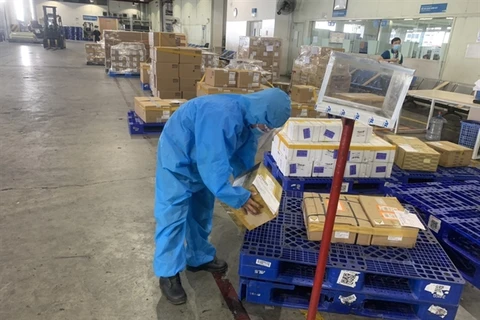 Compared to five years ago, the number of employed people in Vietnam has increased by 26 percent. Labourers have stable jobs with wages increasing year on year. (Photo: baochinhphu.vn)
Compared to five years ago, the number of employed people in Vietnam has increased by 26 percent. Labourers have stable jobs with wages increasing year on year. (Photo: baochinhphu.vn) According to the directive, compared to five years ago, the number of employed people in Vietnam has increased by 26 percent. Labourers have stable jobs with wages increasing year on year. The life of labourers has improved, working conditions and labour hygiene and safety are ensured, while basic international labour standards have been widely applied at businesses.
However, in the context of COVID-19 which has seriously affected production and business, many groups of labourers, especially workers in simple jobs, are still working in low quality environments and struggling with difficulties.
The Cabinet leader asked the State Bank of Vietnam and Social Policy Bank to continue supporting programmes and offer policies which allow employers to borrow loans to pay wages.
At the same time the Vietnam General Confederation of Labour must pay attention to employees’ material and spiritual lives.
PM Chinh ordered relevant ministries and localities to focus the investment in social infrastructure meet the living, study and entertainment demands of labourers, take hygiene measures at workplace and propose micro-policies to support workers.
They must find solutions to lift difficulties related to housing of factory workers and develop the model of industrial parks-urban area-services to meet demands of factory workers and experts.
The PM highlighted the need to follow COVID-19 protocols at industrial parks, processing zones and share difficulties with labourers during the pandemic.
The PM assigned the Ministry of Labour, Invalids and Social Affairs, to finalise draft policies to support labourers and businesses in the pandemic, sticking to the dual targets of maintaining business and production and combating the pandemic.
Ministries and localities must continue to finalise legal policies on employment, wages, social insurance, occupational safety and health on the basis of summarising and evaluating the practice of law implementation.
Learning from employment crises due to the impact of COVID-19, authorities must make amendments to wage policies.
To ensure workers’ benefits, grassroots-level trade unions at enterprises must hold negotiations and sign collective labour agreements with workers, especially agreements on wages counted based on productivity, according to the directive./.
VNA























